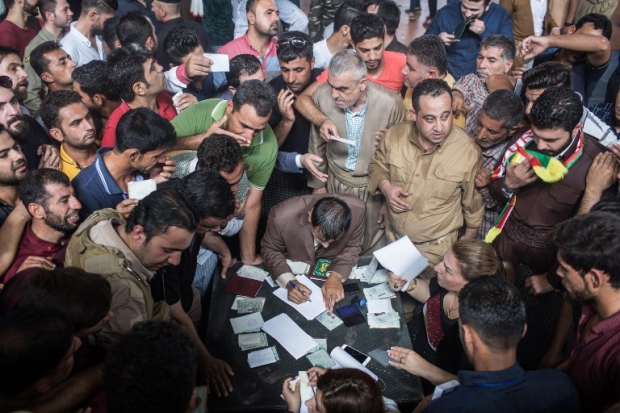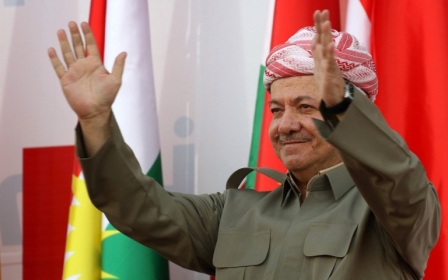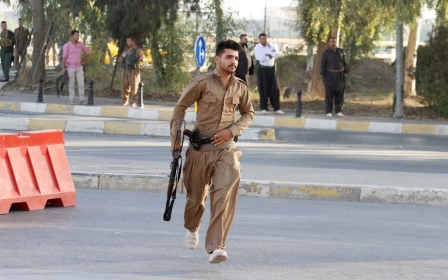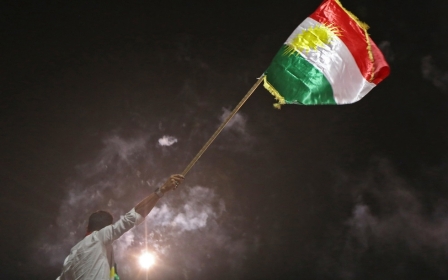The Kurdish independence genie is well and truly out of the bottle
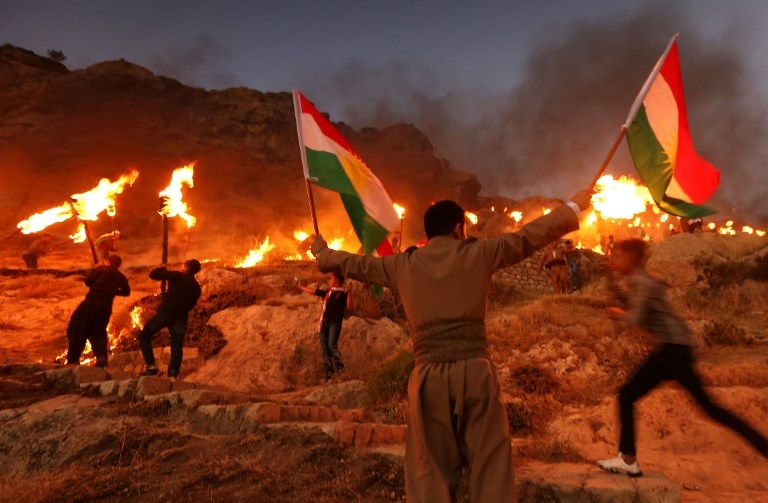
The result of Kurdistan's independence referendum was never going to be a surprise. Even before the voting finished on Monday evening, voters had to wade through triumphalist crowds to reach the polling stations.
It was clear that among many who raised concerns about the timing, politicisation, and conduct of the referendum, the emotional case for voting yes for independence was irresistible.
Kirkuk was clearly divided and we had no difficulty identifying eerily quiet Arab and Turkoman districts, which contrasted with the crowds congregated at the polling stations in the Kurdish neighbourhoods
I spent the day in Kirkuk, alongside scores of other international observers invited by the High Election Commission with our expenses paid for. We were provided with drivers, although no translators, and allowed free passage around the disputed territories and the rest of the KRG area.
We were not trained as monitors, but were free to observe what could be found by our own wits. Some of the observers were more impartial than others it should be said, with overseas Kurds using their connections in other countries to invite observers. But enough were trying to do their job properly to give overall confidence in the process.
Kirkuk was clearly divided and we had no difficulty identifying eerily quiet Arab and Turkoman districts, which contrasted with the crowds congregated at the polling stations in the Kurdish neighbourhoods. At some centres, it was positively party time towards the close of poll.
A century of ups and downs
It is difficult to deny that the international community, and the UK in particular, has a historic debt of honour to support the aspirations of the Kurdish people's inherent right to self-determination.
The promise to allow the people of Kurdistan to decide their fate by referendum was first introduced in the 1920 Treaty of Sèvres between the Ottoman Empire and the Allied Powers, only to be dropped three years later in the Treaty of Laussane following the Turkish war of independence.
Since then, the Kurdish story is replete with horrendous suffering at the hands of Saddam Hussein, and the recent heroic sacrifice in their and our fight against the Islamic State (IS) group. Over this time, the facts on the ground have changed dramatically and the de-facto autonomy of Iraqi Kurdistan has been crystallising ever since John Major instigated the no-fly zone over northern Iraq following the first Gulf War.
Genuine concerns about the wisdom of the decision to hold the referendum on 25 September, rather than any disregard for the rights of Iraq's Kurds, led the US and UK to attempt to mediate between Erbil and Baghdad and to call on the Kurdish Regional Government (KRG) to postpone the proceedings.
Regional security risks
Having opposed the referendum so vocally, the US and UK must now ensure that they do not inadvertently embolden Baghdad, Ankara, and Tehran to take the very destabilising steps that the West fears.
Baghdad has demanded that Erbil hand over control of all entry and exit points, including airports, by Friday at 6pm. It was made clear to me today at a senior level this is not going to happen
While the vote proceeded peacefully, the risks to regional security are still present, and Baghdad has demanded that Erbil hand over control of all entry and exit points, including airports, by Friday at 6pm. It was made clear to me today at a senior level this is not going to happen. What follow up action then ensues is unclear, but I'm glad my flight home is before then!
The referendum has ensured that the Kurds have received high level international attention, even if UK/US/EU official frustration at another unwelcome complexity in an already complex region, is palpable. They both need and deserve support to navigate the difficult waters ahead, even if it is tiresome.
Personally, I can understand their decision not to engage in another two or three years of dialogue with Baghdad before a referendum, even if UK/US sponsored, as they believe their leverage is at its maximum now. This was my first ever visit to Kurdistan and I cannot claim that I would have taken the time had it not been for the referendum.
Never going back
Kurds in opposition to the ruling KDP eventually rallied to support the referendum, but any Kurdish unity is historically brittle. There is a leadership crisis among those opposed to President Barzani and I would expect his party to ride the national fervour to a stronger position in November's KRG elections.
Any secession of Kurdistan will further destabilise the sectarian balance in the rest of Iraq
The unification of the peshmerga, the resumption of parliament, the development of the judicial system, the drafting of a constitution, and the fixing of the economy, all in good time for any formal independence, will be important to the success of a nascent Kurdish state.
A properly functioning democracy will also be necessary to assuage the fears of the Arab and Turkomen minorities in Kirkuk and elsewhere, who probably largely boycotted the vote, that their rights would meet the same fate as other minorities in the region.
Any secession of Kurdistan will further destabilise the sectarian balance in the rest of Iraq. The reintegration of Sunni communities into a political system dominated by the Shia was already a challenge for the post-IS stabilisation process. Such radical changes to the demographic arithmetic caused by Kurdish secession and the likely need to rewrite the Iraqi constitution will present the Sunnis with an even greater challenge.
They, and the rights of all minorities, must be supported by all within the international community. This is not just about what is right: in the end, it is fundamental to long term stability. It should not be necessary to seek statehood to protect what is important about your culture and ethnic identity from a majority within your nation state. It is hardly surprising that other nations do not welcome the instability created by demands for self-determination.
However for the Kurds, a century on from the ups and downs of Sykes-Picot, Versailles, Sevres and Lausanne, the independence genie is well and truly out of the bottle and it's not going back.
- Crispin Blunt is the Member of Parliament for Reigate and is a former chairman of the Commons foreign affairs committee.
The views expressed in this article belong to the author and do not necessarily reflect the editorial policy of Middle East Eye.
Photo: Earlier this month, Iraqi Kurds wave Kurdish flags and hold burning torches as they walk up a mountain during a gathering to show support for the upcoming independence referendum and encourage people to vote in the town of Akra, some 500km north of Baghdad (AFP)
New MEE newsletter: Jerusalem Dispatch
Sign up to get the latest insights and analysis on Israel-Palestine, alongside Turkey Unpacked and other MEE newsletters
Middle East Eye delivers independent and unrivalled coverage and analysis of the Middle East, North Africa and beyond. To learn more about republishing this content and the associated fees, please fill out this form. More about MEE can be found here.



